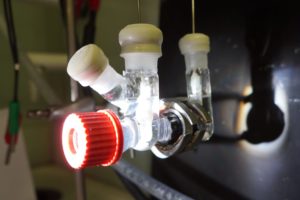By Atonu Choudhurri

Protecting the climate isn’t just about saving polar bears – it can be local.
For a change, move over all global climate talks. Think local. Time is when climate scientists are locked in a tangle ironing out methods to reach net-zero targets, a young scientist from Shillong offers a unified solution to some of the gravest civilizational crises – climate change, environmental pollution and the rising demand for clean energy systems.
The acumen of the young energy scientist, 27, who hails from Rynjah, and became an instrument of a relook at the climate action plan, provided a new scope of further research to solve the climate crisis.
It’s like putting the best foot forward in developing a ‘circular economy’, where wastes are transformed into useful material.
 According to him, the newly-devised technology would immensely help scientists and engineers tackle major environmental problems such as climate change, energy crisis and plastic pollution. His research team aimed at converting greenhouse gas and plastics into useful products (fuels and chemicals) in a single integrated process using only sunlight, which is an abundant energy source. Through this breakthrough, it is realised for the first time that these individual challenging processes can be driven together using solar energy and with further scaling and research, the technology has the potential to decarbonise industrial sectors, generate clean fuels and create a sustainable circular economy.
According to him, the newly-devised technology would immensely help scientists and engineers tackle major environmental problems such as climate change, energy crisis and plastic pollution. His research team aimed at converting greenhouse gas and plastics into useful products (fuels and chemicals) in a single integrated process using only sunlight, which is an abundant energy source. Through this breakthrough, it is realised for the first time that these individual challenging processes can be driven together using solar energy and with further scaling and research, the technology has the potential to decarbonise industrial sectors, generate clean fuels and create a sustainable circular economy.“A solar-driven technology, which could help address plastic pollution and greenhouse gases at the same time, could be a game-changer in the development of a circular economy,” says Subhajit, the paper’s co-first author.
 The reactor, which features two compartments built separately for greenhouse gases and plastic waste, uses a light absorber called perovskite, a “promising alternative to silicon for next-generation solar cells,” according to the university. A chemical catalyst — which, importantly, can be altered and tuned depending on the machine’s output — is integrated into the light absorber.
The reactor, which features two compartments built separately for greenhouse gases and plastic waste, uses a light absorber called perovskite, a “promising alternative to silicon for next-generation solar cells,” according to the university. A chemical catalyst — which, importantly, can be altered and tuned depending on the machine’s output — is integrated into the light absorber.“What’s so special about this system is the versatility and tunability — we’re making fairly simple carbon-based molecules right now, but in the future, we could be able to tune the system to make far more complex products, just by changing the catalyst,” Subhajit continues.
A former student of St. Edmund’s School, Shillong, and Army Public School (APS) Shillong, Subhajit chose to follow his heart. Soon after topping the Class 12 CBSE board exam from APS Shillong, Subhajit went to the Indian Institute of Science Education and Research (IISER) Kolkata for an integrated BS-MS dual degree. His perseverance saw him clear exams as a gold medallist in 2019. Thereafter, he went on to pursue Ph.D. at the University of Cambridge, UK.
 He has been interested in the development of new materials and technologies for important and useful applications using the tools of physics, chemistry, and engineering.
He has been interested in the development of new materials and technologies for important and useful applications using the tools of physics, chemistry, and engineering.The 27-year-old scientist is quick to acknowledge the influence of his parents and family members, and the guidance of teachers behind his success.
“My teachers and professors played a vital role in igniting my interest in these domains, and I have received constant support and encouragement from my parents and family members which made it possible for me to pursue scientific research,” he says.
According to the young scientist, several pivotal moments changed the course of his life and shaped him as a scientist. He attributes his decision to join IISER Kolkata after class 12. It introduced him to in-depth scientific research.
“Getting an offer from the University of Cambridge to pursue a Ph.D. in the areas of materials and energy sciences was the next important moment in my career. Finally, I think that the Covid-19 pandemic, to some extent, also played a role in influencing my perspective. The lockdown in the UK was announced just a few months after I started my Ph.D. and this pushed me to work harder and with more perseverance.”
 At Cambridge University, he got the opportunity to pursue his goals and hone his skills. Despite having an understanding of the problem which he wanted to solve, most of the outcomes were not predictable.
At Cambridge University, he got the opportunity to pursue his goals and hone his skills. Despite having an understanding of the problem which he wanted to solve, most of the outcomes were not predictable.“It was at the beginning of the second year of my Ph.D. (early 2021) when my team and I at Cambridge had envisioned building a system that had the potential to tackle the global problems of the energy crisis, climate change, and environmental pollution at the same time. We were aware that such a technology would have widespread positive ramifications but designing one would be challenging. However, with meticulous planning, calculations, and despite countless failed experiments along the way, we finally managed to develop the solar-driven technology,” the scientist says.
In times when the perils of climate change are looming large on the horizon and stark warnings are being sounded about the impact of climate change precipitated by ecosystem collapse, species extinction and deadly heatwaves, any pragmatic step towards attaining sustainable goals can be a step forward. The action does the talking not postures, or activism.



